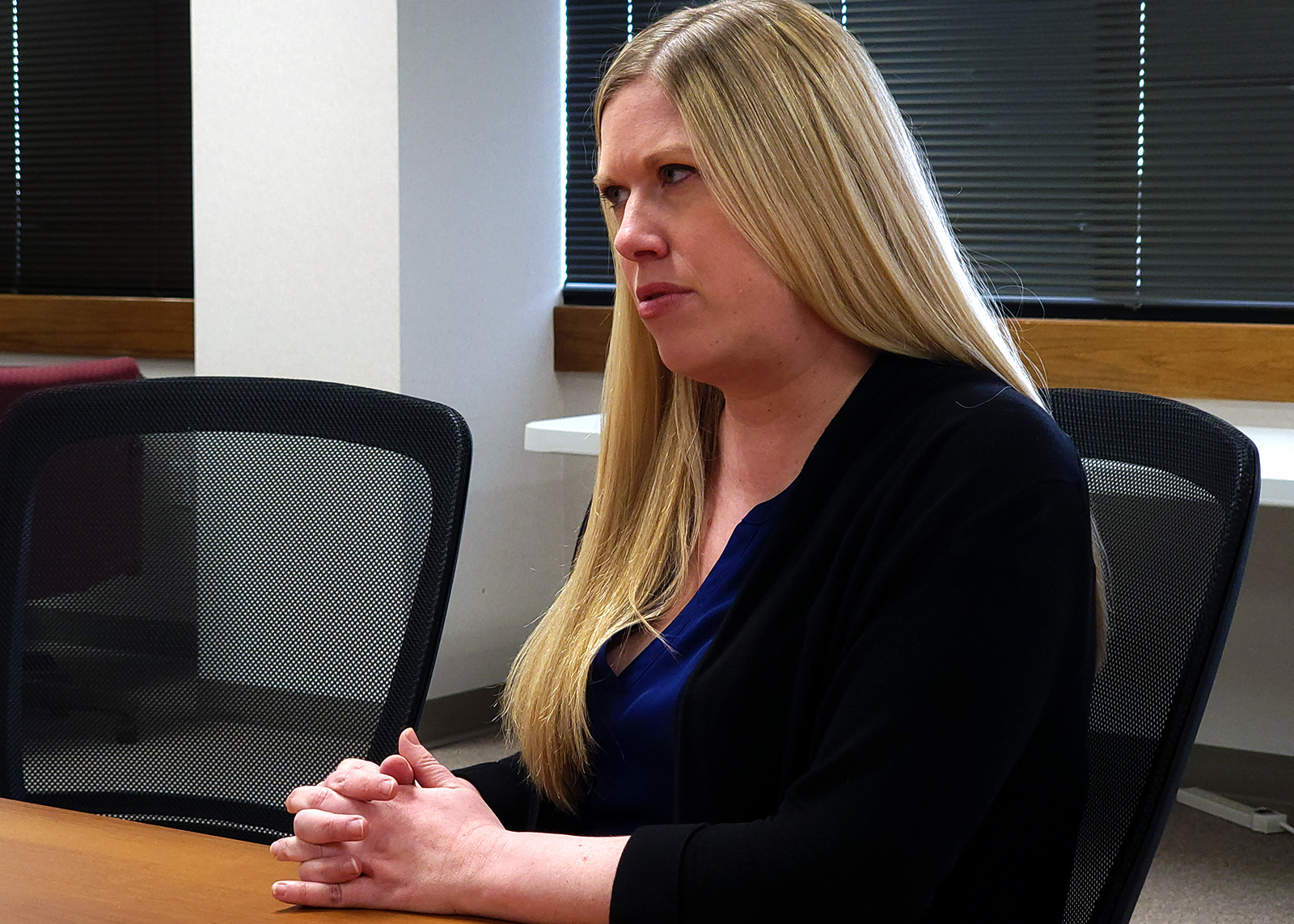IN-DEPTH |
Part of a series on domestic violence in Springfield and Greene County. Need help? See related story.
The woman told the officer that Christopher punched her in the mouth and then placed both hands around her neck, preventing her from breathing.
Christopher let go of her neck and said “B**ch, you better hope I don’t go to jail over this.”
He then deflated at least two of the tires on her vehicle and said, “You’re not going anywhere. I promise you that.”
These are details from a Springfield Police Department probable cause statement dated Nov. 29, 2022. The Hauxeda is not publishing the defendant’s full name to protect the identity of the victim.
Christopher was initially charged with multiple domestic assault charges and kidnapping — all felonies.
Those charges have since been dropped because the victim would not cooperate, said Emily Shook, lead prosecutor with Greene County’s Domestic Violence Unit.
It’s a tale that is all too common. Prosecutors say that in domestic violence cases, the reason charges are dropped is almost always because the victim declines to testify.

- Part I: Black eye for Greene Co.
- Part II: Obstacles to leaving
- Part III: Systemic issues
- Part IV: Searching for solutions
It is estimated only about 25 percent of domestic violence incidents are reported to law enforcement. And of those incidents in which charges are filed, victims decide to not cooperate with prosecution 70 percent to 80 percent of the time, Shook said.
The reasons vary. They love their abuser. They rely on the abuser for housing and money. They don’t want to be a “snitch.” They have kids together. Their pastor tells them to “work it out” or “submit.” They are embarrassed.
And particularly, when their abuser is not in jail, they are afraid.
Offenders’ family, friends will call victim ‘snitch’
It’s common for word to spread when charges have been filed, Shook said, and then the offender and/or the offender’s family and friends pressure the victim to not cooperate with the investigation or court proceedings.
It might be a situation where the offender appears remorseful and showers the victim with love.
Or it might be a very different type of pressure.
“If you’re in a culture where cooperation with law enforcement or making a report is perceived negatively, you are a snitch. You got somebody in trouble,” Shook said. “It’s very much blaming. It’s not his fault for committing the offense. It’s her fault for reporting the offense.

“Sometimes in the view of a victim’s community, that’s the victim’s fault,” Shook said. “They’re the ones who set this whole thing in motion. If they would just be quiet and not show up for court or not make the report for law enforcement or say that it was all a lie.
“It’s just something that keeps people trapped.”
Offenders often give their friends and family “sob stories” from jail, saying they have to sleep on the floor, that the food is terrible, they are cold and other inmates are being mean to them, Shook said.
“And then people, family members, neighbors, just all someone's associates will turn on someone and say, ‘this is all your fault. (You’re) the reason that person's not here to work or not here to take care of their kids or are not here at Christmas,’” Shook said.

Sometimes faith leaders counsel couples to work it out
Lisa Saylor and Janice Thompson are both survivors of domestic violence who have gone on to be vocal advocates and have shared their stories with the media and lawmakers.
Both women said faith leaders are not usually trained to recognize the signs of abuse and often are not helpful in counseling couples when there is domestic violence.
Saylor and Thompson believe some clergy rely too heavily on Bible verses that encourage women to submit to their husbands, such as these words found in Ephesians:
“Wives, submit to your own husbands, as to the Lord. For the husband is the head of the wife even as Christ is the head of the church, his body, and is himself its Savior. Now as the church submits to Christ, so also wives should submit in everything to their husbands.”
Ephesians 5:22-24
Both women said they were counseled by the faith leaders to “work it out.”
“I hadn’t left yet, so what I heard was, it was my fault. I should do better,” Saylor said. “And it plunged me back under the waters and caused me to stay longer.”
Thompson was raised Catholic and for a time believed divorce wasn’t an option. Her abuser (her now ex-husband Greg Marvin) would attempt to use religion to manipulate and control her, she said.
“Greg knows the Bible. He will drop to his knees and pray,” she said, “and (say), ‘I’m so sorry for all I've done. Please forgive me. Look, she won't forgive me, she’s the problem right?' They manipulate, and I think there is nothing more heinous than when someone takes away a person’s faith.”
Saylor recalled her pastor actually telling her she should “submit” and work harder to get the children to behave. But it was a different pastor — a chaplain called to the scene of her ex-husband’s suicide attempt — who counseled her that it was OK to leave the abusive relationship.
“Yes, the Bible does say and talk about submission,” Saylor said. “But in the verses before that, it says that your husband is to love you the way Christ loves the church. And I don’t think Christ went around beating the church.”
News stories can make matters worse
If the assault winds up in the news — even when the victim is not named — it can cause a victim to not cooperate with investigators. Victim’s names are redacted in public documents. If the media outlet happens to know the victim’s name, most outlets (including the Daily Citizen) would not publish the victim’s name without consent.
But in most domestic cases, it’s not hard for those close to the offender to figure out who the victim is even when their name is not mentioned in the story.
“It's very clear to her and everyone around her who that’s about,” Shook said. “It has his name and has all the details of what happened, and it doesn’t identify her, but everybody knows her.”
The idea that the assault might make the news also dissuades reporting by victims from middle- and upper-class families, she said. The abuser might be well known in the community, Shook said.
“There will be a news story that says ‘Prominent banker and philanthropist is a batterer,’” Shook said. “Everyone will know. You’re in all the pictures with them in 417 Magazine and at the charity events. Your names are associated with each other. Everybody at church knows who you both are. The school knows who you both are.”

Attorney: charges often dropped at preliminary hearing
Kyle Kanable has practiced both family and criminal law in Springfield for nearly 20 years. In a unique law practice, Kanable’s time is split between criminal defense cases and serving as a guardian ad litem for children in family court. He spoke to the Daily Citizen in March, just weeks before he was appointed to be a Greene County family court commissioner.
According to Kanable, who has often represented defendants charged with domestic assault, that first preliminary hearing is the moment of truth: Will the victim come to court and testify to get over the initial hurdle in proving that the defendant likely committed the crime?
Most of the time, the answer is no and the victim does not show up for the preliminary hearing, Kanable said.
“They have to have the alleged victim come and testify,” Kanable said. “Or they have to have an independent witness who can testify as to the events that occurred and is familiar with the individuals.
“If they get dropped, that typically means the alleged victim didn’t show up for court or didn’t want to press charges,” he said. “And the state can’t proceed. It’s not that the state didn’t want to. It’s just that it can’t.”
Based on his experience as a defense attorney, Kanable said the reason this happens almost always is because the defendant and victim are communicating again — usually against court orders.
“The problem is they still talk,” he said. “And they will do it behind the attorney’s back. They will do it behind the court’s back”
“The court can say constantly, ‘You are not to have contact with the alleged victim in this case. Do not go talk to them.’ How can the court monitor that?” Kanable asked. “This individual may send a text that says, ‘Hey, let’s talk. I'm very sorry about what happened.’
“Then the alleged victim falls into the trap of: ‘They feel very remorseful. Things are going to get better. I don’t want him or her to have a criminal record,’” Kanable said. “And then they just don’t show up. Then guess what happens? They get back together and the cycle just happens again.
“You will see that same person back in court.”
Maybe they feel safe and don’t want to ‘rock the boat’
Jamie Willis, director of the Greene County Family Justice Center, pointed to another common reason victims don’t want to cooperate with prosecution. Sometimes the victim has been able to get away from their abuser, they’ve got an order of protection and/or their abuser doesn’t seem interested in stalking or hurting them.
“They are like, ‘I am in a safe place now. He’s out of my life. And if I escalate this by using my voice, it's just going to come back at me again,’” said Willis, whose center is a one-stop shop for victims of any kind of abuse. “It’s not that they don’t want that person held accountable. But they feel like it’s a dangerous decision for them to make.”

Often victims are dealing with both civil and criminal court cases at the same time, which can be overwhelming and exhausting for someone who has experienced years of trauma, said Kristen Snell, community outreach director at Harmony House, a Springfield shelter for victims of domestic violence.
“When you have court cases that take so long, it can be really difficult for the victim to want to continue in that process,” Snell said. “With a family court case potentially taking a year, that is a really long time for a victim to continue to appear in court or just sort of sit around and wait, especially if the abusive partner is able to have access to the kids via visits and things like that.
“It can be a really scary time,” she said. “And the criminal justice system as a whole isn’t the most trauma-informed entity. When a victim has to go to court and have to continue to face their abusive partner, that can be really scary, especially if it’s been a really long period of time that they’ve been separated and then they have to start seeing each other in court.”
If victim not ready to testify today, they may be weeks or months from now
Shook said it’s common for a victim’s level of cooperation to fluctuate at different times.
“People go back and forth sometimes after the incident. They will be uncooperative and then a new incident occurs and now they are cooperative,” Shook said. “They get resources in place, maybe where if someone is able to remove barriers to their cooperation with the prosecution, that can really change the way that we interact with them.”
In recent years, Greene County has taken several steps to offer more support and better services for victims of domestic violence. These initiatives are intended to not only help victims stay safe, but to help prosecutors go after abusers.
- The Greene County Family Justice Center, a one-stop shop of service providers for victims, was created in 2018.
- In 2022, the Greene County Prosecutor’s Office created a Domestic Violence Unit, which is housed inside the Family Justice Center and focuses solely on cases involving domestic violence.
- The Springfield Police Department also recently created a Domestic Violence Unit to focus on investigating these types of crimes.
Still, even with this countywide focus to hold abusers accountable, successfully prosecuting them is difficult because many victims refuse to cooperate.
“We decline the overwhelming majority of cases that get submitted to our office because we don't have sufficient evidence,” Shook said. “We don't have cooperative witnesses.”
Shook said it’s “more common than not” that victims recant. Often, they do it quickly.
“Sometimes the victim decides to change and take the side of the offender very, very quickly after an incident occurs,” Shook said. “So we’re trying to get in there and provide them options so that they are making informed decisions, that they're aware of the available resources that are going to help them.”

Prosecution a ‘balancing act’ that doesn’t always depend on victim’s cooperation
Defendants in any criminal case have a constitutional right to confront any witness against them.
But the prosecution doesn't necessarily need the victim’s testimony and cooperation if there is enough evidence — such as an independent witness or a confession.
According to Shook, the domestic violence unit’s No. 1 priority is “public safety, the safety of the victim and the safety of everybody who’s involved.”
“Because that’s the primary concern, there are times where we determine that proceeding with the prosecution appears to be the best way to protect someone,” she said, “and there are other times where proceeding with prosecution appears as though it might create greater risk to them.
“So that’s part of the calculus,” Shook said. “If I can proceed with a case without the victim’s cooperation, and we feel confident that it occurred and we can do it in a way that keeps that victim safe — even if it’s sort of against their wishes — then that may be something that we need to do because, again, we are prioritizing public safety.
“It’s not as simple as just saying the victim wants to cooperate or not and then we’ll prosecute the ones who are cooperative and not prosecute the ones who are not,” she said. “People go back and forth sometimes after the incident. They will be uncooperative and then a new incident occurs and now they are cooperative.”
Sometimes the victim decides to cooperate with the prosecution only after they get into a safer living situation.
Also, there are times when the victim is not in an emotional state to proceed, Shook said.
“They have to testify two or three times. They may have accusations made against them,” Shook said. “Defense attorneys can be very hard on them. Sometimes the court can be very hard on them. The defendant or the defendant’s family or other associates might be threatening them or putting pressure on them.
“If you have somebody who is not in a position to withstand that, even with the resources that we’re able to connect them with and the support that we’re able to provide,” she said, “there are times (we) determine that it would be best not to prosecute because you don’t want to unintentionally promote a negative outcome.
”It’s sort of a balancing act.”
About Living in Fear
This special investigative report explores the far-reaching and insidious nature of domestic abuse in our community. Living in Fear is being presented in four parts over two months:
- Part I: Black eye for Greene County, which was published May 8-11, looks at the depth and breadth of the problem here.
- Part II: Obstacles to leaving, published this week, examines the dynamics and complications facing victims looking to leave abusive relationships.
- Part III: Systemic issues, to be published in early June, puts a focus on the criminal justice system and potential shortcomings.
- Part IV: Searching for solutions, to be published in late June, taps local, regional and national experts in search of ways to improve the system and reduce domestic violence.
Next in the Living in Fear series: A look at the dynamics of power and control in domestic abuse situations.

